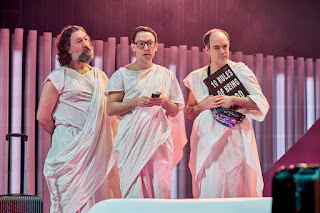She knows it'll still be hard work keeping the shop open, but she hasn't reckoned with everyone exploiting her good nature to demand food, free cigarettes, six months' advance rent for her landlady (Melody Brown) and bribes for a distractingly hot policeman (Camille Mallet de Chauny.)
She also has the misfortune to fall in love, with the suicidal pilot Sun (Aidan Cheng.) He's not interested in her, but he is interested in her money so a wedding is quickly arranged - dependant on a hefty dowry, of course. Soon Shen Te has gone from windfall to debt, and the only way she can see out of it is to invent a new persona: She becomes her male cousin Shui Ta, who has no reputation to take advantage of, and will be ruthless in protecting her interests. Gradually Shui Ta becomes the dominant personality, and comes to dominate the town as well.
Brecht's middle name certainly wasn't "subtlety" (it was Friedrich) and Anthony Lau's production doesn't try to pretend otherwise: It dives head first into a colourful, neon world of slides, giant cigarettes and aggressively buff frogs, all of which might be happening inside a claw crane machine, designed by Georgia Lowe. Characters materialise out of the ball pits at the corners of the stage, and Shen Te gets spun around on her own wedding cake, with Jon Chew underneath her manually operating the revolve. It's weird, frantic and often very funny, with adaptor Nina Segal and composer DJ Walde turning the musical breaks into K-Pop karaoke moments.
All this frenetic humour is counterbalancing an essentially very bleak story. Goodness - a quality so vague the gods demand to see it but can't define it - is punished, not because everyone else is inherently bad, but because the capitalist system turns everyone into their worst selves just to survive. Shen Te isn't the only person whose generosity is punished: An elderly couple give her a no-questions-asked $200 loan, but when they need it back they go to the back of the queue behind the louder demands. The running theme of men trying to negotiate a marriage to Shen Te is also interesting: As a prostitute she's judged for selling her body, but as a businesswoman and therefore an attractive proposition as a wife, she's expected to accept that being part of a transaction is normal and respectable.
Tredrea provides a grounding central figure among the madness, often exhausted and resigned as Shen Te but increasingly amoral as Shui Ta. She does eventually get a confidante and sidekick of sorts in Mrs Shin (Suni La,) with whom she forms something of a double act in the later scenes. But Leo Wan threatens to steal the show as the quasi-narrator Wang, the part-clownish, part-adorable water seller who's in love with Shen Te and has been lumbered with the essentially freeloading trio of deities (Callum Coates, Tim Samuels and Nick Blakeley, who's strongly channelling Reece Shearsmith.)
I like Brecht but do find that his work can get a bit flabby and go off on tangents, and this is true of The Good Person of Szechwan, particularly towards the end of the first act which gets bogged down in the various suitors for Shen Te's hand. But it picks up again in the second, and among the Technicolor madness delivers one of those simple sentiments that in context really seem to hit me hard, as Togo Igawa's author avatar delivers the moral "don't try to be good, just try to be better."
The Good Person of Szechwan by Bertolt Brecht in a version by Nina Segal is booking until the 13th of May at the Lyric Hammersmith.
Running time: 2 hours 25 minutes including interval.
Photo credit: Manuel Harlan.






No comments:
Post a Comment